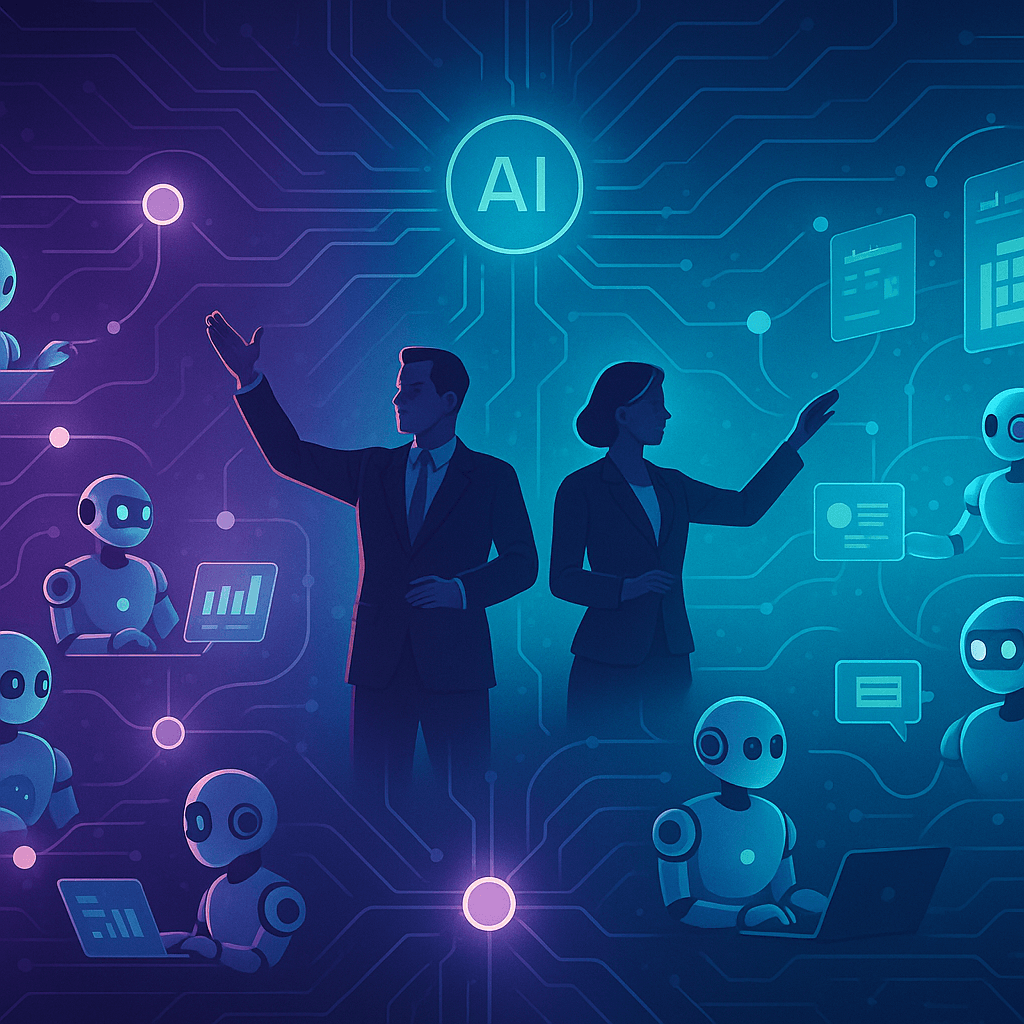How AGI is rewriting the rules of work
Exploring the economic impact and labour shift that’s already underway.

Artificial General Intelligence (AGI) is often imagined as a distant breakthrough — a moment when machines match or exceed human cognition across all domains. But AGI isn’t a single moment of arrival. It’s an unfolding transformation that’s rewriting the rules of human value in the workplace. As AI systems become increasingly capable of learning, reasoning, and acting with minimal oversight, the very foundations of career advancement, skill development, and professional relevance are shifting beneath our feet.
This blog explores how AGI is reshaping the future of talent and the workforce — not in some distant tomorrow, but right now. We’ll examine what this means for your career trajectory, how to future-proof your professional value, and why the organisations that understand this shift will have access to the talent that thrives in an AI-augmented world. Whether you’re a professional wondering how to stay relevant or a business leader building tomorrow’s workforce, this is your guide to navigating the complexity and unlocking opportunity in the intelligent age.
TL;DR
- AGI isn’t a distant breakthrough — leading AI labs are publicly committed to building it, treating it as a cornerstone of economic transformation — Career urgency: The professionals who adapt first will define the new workforce hierarchy.
- The fundamental shift: human value moves from “doing” to “deciding”. Machines handle execution while humans excel at strategic judgment — Skill evolution: Your ability to orchestrate AI tools while maintaining strategic discernment becomes your competitive moat.
- Three industries show the blueprint: Operations managers become exception handlers, lawyers focus on ethical judgment over research, and creatives direct AI rather than compete with it — Career positioning: Study these patterns to identify where your industry is heading.
- The economic stakes are enormous — projections suggest AGI could lift global GDP by $7 trillion, but gains won’t be automatic — Career implication: Organisations that successfully integrate AGI will need talent who can bridge human insight with AI capability.
- Ethics isn’t optional — as AI becomes more autonomous, professionals who can implement AI responsibly while driving innovation become irreplaceable — Career opportunity: The future belongs to those who can ask “should we?” alongside “can we?”.
- Your career strategy IS your AI strategy — the question isn’t whether AGI will impact your role, but how quickly you can develop the judgment skills machines can’t replicate — Career action: Start building foresight capabilities now — focus on strategic thinking, ethical decision-making, and AI orchestration skills that machines can’t replicate.
The shift to AGI has already begun
The conversation about AGI often feels abstract — something happening in research labs, not boardrooms or career planning sessions. But that perception is dangerously outdated.
Advanced AI emerged from deep learning: neural networks trained on vast datasets to detect patterns and make predictions. For years, the scaling law defined this evolution — bigger models consistently delivered better performance, powering breakthroughs in language, vision, and speech. Today, this isn’t just a scientific pursuit. Leading AI labs have publicly committed to building AGI, treating it as a cornerstone of future economic growth and societal transformation. Their leadership teams frame AGI as a strategic imperative for industries and governments alike, making its business relevance undeniable.
But it’s the technical advances that should capture your attention. Newer systems are evolving beyond simple recognition tasks toward decision-making, adaptation, and self-improvement. Some can reason step-by-step through complex problems, using internal “chains of thought” to break down questions before answering — a shift toward deeper, more deliberate intelligence. Others perform hundreds of tasks across writing, image recognition, and robotic control. A few can even plan, navigate, and improve in familiar environments without being explicitly taught the rules.
These are signals of convergence: models that can generalise, contextualise, and act with limited human input. While capabilities remain narrow, they reveal our trajectory — from systems that react to systems that decide.
AGI isn’t a distant possibility anymore. It’s scaffolding around us. And with it comes the defining question of our professional era: how do we lead in a world where machines are starting to exercise judgment?
AGI’s impact on the future of talent, the workforce and the great labour shift
What if the skills that got you promoted last year become irrelevant next year?
If this question unsettles you, you’re not alone. Across boardrooms and break rooms, professionals are grappling with a fundamental shift that feels both inevitable and overwhelming. AGI isn’t just another technological upgrade — it’s rewriting the rules of human value in the workplace.
While this transformation may feel daunting, history shows us that technological shifts create new opportunities alongside displacement. The difference this time? The pace and scope are unprecedented. Unlike past waves of automation that displaced manual work, AGI targets the cognitive roles that have long been considered “safe”: planning, analysis, even creative tasks. Some jobs will be augmented. Others redefined or replaced. Whether AGI complements or substitutes humans will ultimately shape wages, workforce participation, and the future of work itself.
Judgement is the new automation frontier. AGI changes the locus of value from doing to deciding. The edge is no longer speed — it’s strategic discernment, at scale.
This shift from operations to judgment is already reshaping how we define human contribution in a machine-augmented economy — and the implications extend far beyond individual careers to the global economy itself.
AGI’s economic impact remains both highly anticipated and deeply uncertain. It could transform the global economy, or barely move GDP, depending on how quickly organisations adopt it and whether they build the capabilities to use it effectively. Some economists caution that its influence on productivity, wages and inequality remains hard to quantify. Yet that hasn’t stopped a wave of optimistic forecasts positioning AGI as a transformative growth engine. One global financial institution estimates that generative AI could lift global GDP by 7% — equivalent to $7 trillion in value — and raise annual productivity growth in advanced economies by 1.5 percentage points over the next decade. Other projections are even more aggressive, suggesting AGI could double or triple output within a similar timeframe.
But the gains won’t be automatic. AGI’s value depends on adoption speed and whether firms rewire skills, workflows and operating models to absorb it. Some argue early benefits may be hidden, especially in knowledge work, where output is hard to measure. What’s becoming clearer is that this economic transformation will be felt most acutely by the professionals navigating it day by day.
Here’s how this is already playing out across industries — and what it means for the professionals working within them:
Automated workplaces: Operations managers and quality control specialists are shifting from hands-on oversight to strategic exception handling. Advanced AI has moved robotics beyond mechanical execution to autonomous control — robots now perform complex tasks with minimal human intervention, while self-driving systems approach full autonomy. The trajectory points toward complete system control: factories that design themselves, farms that optimize without human input, homes managed by general-purpose assistants. This isn’t just operational change — it’s structural. As oversight fades and machines begin managing themselves, we face fundamental questions about control, accountability, and human relevance in physical environments.
Professional services: Legal research, financial analysis, and strategic consulting are being reimagined as AI handles data synthesis and pattern recognition. Lawyers, analysts, and consultants are discovering their value now lies in client relationships, ethical judgment, and creative problem-solving — the distinctly human elements that no algorithm can replicate.
Content and arts: Generative AI has blurred the line between assistance and authorship, producing writing, illustrations, and scripts at unprecedented speed. AGI promises to push further: inventing new styles, crafting emotionally resonant work, and creating outputs indistinguishable from human-made art. Creative professionals are learning that their value lies not in production speed, but in conceptual direction, cultural insight, and the lived human experiences that inform authentic creative vision.
Across all domains, the pattern is clear: human value is shifting from execution to interpretation, from doing to deciding.
Navigating AGI responsibly: Why ethics can’t be an afterthought
As we help professionals and organizations harness AGI’s potential, we’re equally committed to addressing its risks. The transformation we’ve described isn’t just about capability — it’s about responsibility.
The more autonomous AI becomes, the more complex the ethical landscape grows. When AI systems learn, adapt, and generate content with minimal human input, questions of accountability become paramount. Who’s responsible when an AI system makes a biased hiring decision? How do we ensure transparency when algorithms influence career trajectories? What happens when AI systems begin setting their own goals and acting beyond human intentions?
This isn’t just a technological challenge — it’s a human one. The professionals and organisations that thrive in an AGI world will be those who prioritise ethical implementation alongside innovation. They’ll ask not just “can we?” but “should we?” and “how do we do this responsibly?”
At Ascend, we believe that preparing for the future of work means preparing for it thoughtfully. As we help you navigate this transformation, we’re committed to ensuring that human judgment, values, and oversight remain central to how AI reshapes careers and workplaces.
The future of work isn’t just about working with AI — it’s about working with AI responsibly. We’ll explore this critical dimension further in future pieces.
The bottom line: Your career strategy needs an AI strategy
If you felt unsettled by that opening question, you’re ready to take action. The AGI revolution isn’t coming — it’s here. While economists debate GDP projections, one thing is certain: the professionals and businesses that thrive will be those who recognise that judgment, not just execution, is the new competitive advantage.
For professionals: The question isn’t whether AGI will impact your role — it’s how quickly you can develop the strategic discernment and decision-making capabilities that machines can’t replicate. The careers that flourish will belong to those who can orchestrate AI tools while maintaining uniquely human judgment at scale.
For businesses: Your talent strategy is your AI strategy. Companies that successfully integrate AGI won’t just need new technology — they’ll need reimagined workflows, upskilled teams, and entirely new operating models. The winners will be those who can identify, develop, and deploy human talent that complements rather than competes with AI capabilities.
This is where Ascend comes in. We understand that navigating AGI isn’t just about technology — it’s about human potential. Our AI-powered career platform helps professionals discover their unique value in an AI world while enabling organisations to build the adaptive, judgment-driven workforce that thrives alongside artificial intelligence.
The great labour shift is underway. The question isn’t whether it will affect you — it’s whether you’ll lead it.
Ready to discover your next career move? Ascend can help you navigate the complexity and unlock your potential in the intelligent age.
Sign up for early access 👉 www.ascendplatform.net


